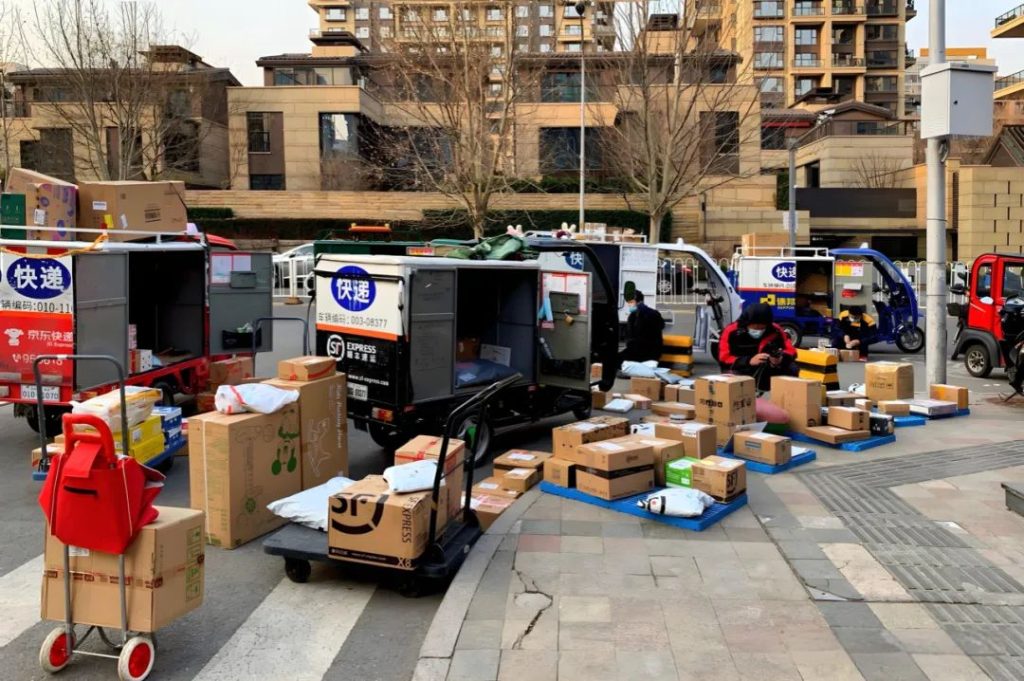
Read More《驿站&快递员:全员社保下的“生死”纠结?》
Positive Comments: The New Social Insurance Regulations Inject Legal Force into the Protection of the Rights and Interests of Express Delivery Workers and Promote the Standardization Process of the Industry
The promulgation of the Supreme People’s Court’s “Interpretation (II)”, especially the provision that “the agreement between the employer and the employee not to pay social insurance is invalid”, represents a significant legal progress for the express delivery industry. Its positive impacts are mainly reflected in three aspects:
Firstly, it clarifies the laborer status of express delivery workers and fills the legal gap in the employment of the new employment forms. For a long time, due to the prevalence of the franchise system and outsourcing system in the express delivery industry, the labor relationship between couriers and enterprises has been deliberately blurred. By signing “cooperation agreements” and “service agreements”, enterprises shift the social insurance responsibilities they should bear, leaving workers in an awkward situation of “being a cooperation partner in name but actually being managed by the enterprise”. The new regulations directly deny the validity of the agreement of “not paying social insurance”, which is equivalent to erecting a legal barrier for the protection of workers’ rights and interests. For example, in the case of courier Chen in Shanghai, it was very difficult to determine work – related injuries in the past because of the lack of a labor contract. After the implementation of the new regulations, the legal judgment of similar disputes will be more inclined to protect workers. Workers can claim social insurance rights and interests based on the actual employment relationship (such as being managed by the enterprise and abiding by rules and regulations). This is a crucial step for the 84 million workers in the new employment forms from the “gray area” to “clear protection”.
Secondly, it forces enterprises to optimize their employment models and promotes the transformation of the industry from “low – cost expansion” to “high – quality development”. Take JD Logistics as an example. Under its direct – operation model, it fully pays the five social insurances and one housing fund for couriers, which not only enhances employees’ sense of belonging (such as couriers “daring to have a second child with confidence” and “not fearing being unsupported in old age”), but also becomes the core advantage for the enterprise to build a competitive barrier. With a stable team and higher service quality, it occupies an irreplaceable position in the high – end express delivery market. After the implementation of the new regulations, if other enterprises continue to rely on “blurred employment” to avoid social insurance responsibilities, they will face higher legal risks (such as workers terminating the contract and claiming economic compensation). This will force enterprises to re – evaluate the employment cost and long – term benefits. They can either adjust the franchise/outsourcing model and transform to direct operation or standardized cooperation; or improve efficiency through technological upgrading (such as automated sorting and intelligent order dispatching) to offset the increased cost of social insurance payments. This “forcing effect” is expected to push the entire express delivery industry out of the vicious cycle of “price war” and “labor exploitation” and turn to a more sustainable development path.
Finally, it strengthens the society’s attention to the rights and interests of workers in the new employment forms and forms an opinion foundation for multi – party co – governance. The social insurance issues of couriers and station staff have long been regarded as an “industry unwritten rule”, but the promulgation of the new regulations has brought this issue into the public view. From the concern of “less take – home pay” in netizens’ discussions, to the call of industry insiders for “brand owners to assume responsibilities”, and then to the media’s focus on “the survival pressure of small and micro stations”, all sectors of society have reached a deeper consensus on the rights and interests protection of this group. This consensus is an important force to promote the implementation of policies. It not only urges enterprises to reflect on their short – sighted thinking of “profit first”, but also promotes government departments to further improve supporting measures (such as social insurance subsidies for small and micro stations and preferential policies for flexible employees to participate in insurance), ultimately forming a rights and interests protection network of “legal constraints + corporate responsibilities + social support”.
Negative Comments: The Dilemma of Practical Implementation Highlights that the Implementation of the New Social Insurance Regulations Needs to Overcome the Three – fold Obstacles of “Cost – Survival – Cognition”
Although the new social insurance regulations provide legal protection for workers’ rights and interests, their actual implementation in the express delivery industry still faces multiple challenges, and some contradictions may even lead to a deviation between “the original intention of the policy and the actual effect”.
Firstly, the “survival pressure of small and micro entities” of grass – roots stations and outlets may lead to the formality of social insurance payments. Most express delivery stations are individually – owned (husband – and – wife stores or partnership stores), and their monthly profits are meager. (Some stations rely on storage fees and door – to – door delivery fees, and their income fluctuates greatly with the business volume.) If they pay social insurance for their employees, calculated at the minimum base, the monthly labor cost per person will increase by about a thousand yuan (including the part borne by the enterprise and the part borne by the individual). To balance the cost, station operators may take three extreme countermeasures: First, “transfer the cost by reducing salaries”, that is, reduce the storage fees and door – to – door delivery fees of employees, resulting in a reduction in employees’ actual income. Second, “lay off employees to protect themselves”. Stations that originally employed 1 – 2 employees will turn to self – operation, reducing the demand for labor. Third, “avoid employment”, that is, require employees to register as individual industrial and commercial households and sign agreements in the name of “cooperation”, essentially still avoiding social insurance responsibilities. This phenomenon of “the policy from above and the countermeasures from below” may make the implementation of the new social insurance regulations ineffective at the grass – roots level, and the rights and interests of workers will not be truly implemented.
Secondly, the contradiction between the “short – term livelihood” and “long – term security” of workers is intensified, and the acceptance of the policy is tested. The monthly income of express delivery workers (especially station staff) is mostly between 2,000 and 6,500 yuan, and their income stability is poor (depending on the business volume). If the part of social insurance that individuals should pay (about 10% – 15% of the salary) is deducted, the take – home pay of some low – income earners may be reduced by nearly a thousand yuan, directly affecting their daily expenses such as rent and children’s education. The complaints of netizens about “less take – home pay” reflect the workers’ “practical resistance” to social insurance. They are more concerned about their current survival needs rather than future old – age and medical security. This cognitive difference may lead workers to actively cooperate with enterprises to avoid social insurance (such as signing a commitment of “not paying social insurance”) and even have a negative attitude towards safeguarding their rights, weakening the implementation effect of the new regulations.
Thirdly, the “absence of responsibility” of brand owners and the “cost transmission mechanism” of the industry exacerbate the implementation difficulty. The profit distribution in the express delivery industry has long been tilted towards the headquarters (brand owners), and the grass – roots stations and outlets bear the pressure of reduced delivery fees and fine assessments. Take the “Tongda” express delivery companies as an example. Under their franchise system, brand owners make profits by collecting franchise fees and technical service fees, but they do not provide support for the social insurance costs at the grass – roots level. At present, leading brands such as Cainiao Station and Mama Station have not issued clear plans on “how to share the social insurance costs of station employees”, and individual stations can only bear the pressure by themselves. As for express delivery outlets, under the franchise system, outlet operators also face the double squeeze of reduced delivery fees (from 1 yuan per order to 0.8 yuan or even lower) and increased social insurance payments. Eventually, they may transfer the cost to couriers (such as reducing commissions and increasing fines), forming a cost transmission chain of “headquarters – outlets – couriers”, making workers the ultimate “cost bearers”.
Suggestions for Entrepreneurs: Find a Balance between Compliance and Survival and Actively Build a Sustainable Employment Model
For entrepreneurs in the express delivery industry (including station operators, outlet managers and related enterprises), the new social insurance regulations are both a challenge and an opportunity to promote their own transformation. The following suggestions are for reference:
Prioritize compliance and actively adjust the employment model: Whether it is a station or an outlet, the fluke mentality of “blurred employment” should be abandoned. If employees are hired, the labor relationship should be clearly defined, labor contracts should be signed and social insurance should be paid in accordance with the law. If a cooperation model is adopted (such as cooperation with individual industrial and commercial households), it is necessary to ensure that the cooperation relationship is real (such as the other party operates independently and bears its own profits and losses) to avoid being recognized as a labor relationship due to “actual management”. For example, stations can try to combine “self – operation + flexible employment”. Core positions (such as customer service and finance) can sign labor contracts, and temporary sorting and other positions can be hired through third – party compliant platforms to reduce the pressure of social insurance costs.
Optimize operational efficiency to offset social insurance costs: The pressure of increased social insurance payments can be alleviated by improving efficiency. For example, stations can introduce intelligent express delivery cabinets and automated sorting equipment to reduce the dependence on labor; outlets can optimize delivery routes through intelligent order dispatching systems to reduce the labor cost per order; enterprises can strengthen employee skill training to improve per – capita efficiency (such as increasing the daily delivery volume of a skilled courier from 200 to 250 pieces), thereby spreading the unit social insurance cost.
Negotiate with brand owners and strive for support resources: Stations and outlets should actively feedback the pressure of social insurance costs to brand owners (such as Cainiao and ZTO) and promote brand owners to introduce supporting measures. For example, they can require brand owners to reduce franchise fees and technical service fees or provide social insurance subsidies (such as a fixed monthly subsidy according to the number of employees). For enterprises with a direct – operation model (such as JD and SF), a mechanism of “headquarters – outlets” sharing social insurance costs can be explored (such as the headquarters bearing 50% of the enterprise – paid part) to relieve the pressure at the grass – roots level.
Strengthen communication with employees and convey the long – term value of social insurance: In response to employees’ concerns about “less take – home pay”, entrepreneurs need to actively communicate and use specific cases to illustrate the long – term benefits of social insurance. For example, the monthly pension that employees can receive after retirement can be calculated (about 1,500 – 2,000 yuan per month based on the minimum payment base and 30 – year payment), or the difference in protection between commercial insurance and social insurance can be compared (social insurance covers all scenarios such as old – age, medical and work – related injury insurance, while commercial insurance mostly covers a single scenario) to help employees understand that social insurance is “future survival security” rather than “current burden”.
Pay attention to policy dynamics and make good use of flexible social insurance tools: Entrepreneurs need to closely follow the social insurance preferential policies for the new employment forms issued by local governments (such as allowing flexible employees in some areas to pay old – age and medical insurance at a lower proportion) and guide employees to choose suitable ways to participate in insurance. For example, if the employees of a station are flexible employees, they can pay old – age and medical insurance by themselves (with partial subsidies from the enterprise), and the enterprise only needs to pay work – related injury insurance, which can not only reduce the cost but also partially meet the employees’ security needs.
The implementation of the new social insurance regulations is essentially a game between “short – term pain” and “long – term benefits”. For entrepreneurs, only by actively embracing compliance, optimizing models and striving for support can they achieve their own sustainable development while protecting the rights and interests of workers. For the entire industry, this change will promote the express delivery industry to transform from extensive growth based on “labor – intensive” to high – quality development driven by “technology + rights and interests protection”, ultimately achieving a win – win situation for workers, enterprises and society.
- Startup Commentary”Three post-2005 entrepreneurs are reported to have secured a new financing of 350 million yuan.”
- Startup Commentary”Retired and Reemployed: I Became Everyone’s “Shared Grandma””
- Startup Commentary”YuJian XiaoMian Breaks Issue Price on Listing: Where Lies the Difficulty for Chinese Noodle Restaurants to Break Through in the Market? “
- Startup Commentary”Adjusting Permissions of Doubao Mobile Assistant: AI Phones Are a Flood, but Not a Beast”
- Startup Commentary”Moutai’s Self – rescue and Long – term Concerns”





